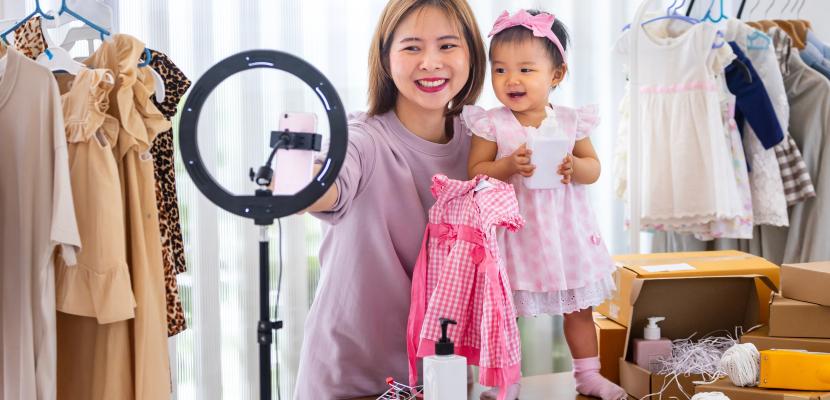
by Dr Tyler Wilson
Are you a parental “sharenter” who uses their children online as a “kidfluencer”?
Do you make money off their brand?
There are many potential harms from parents posting online content featuring their child.
My biggest ethical concern is denying the child the right to engage how they may want to go online, particularly if they are very young.
The digital footprint created by any online activity is massive – especially if a kidfluencer is associated with certain brands, behaviours, and other depictions.
So, any parent making the decision to use their child for content robs the child of the right to engage online on their own terms. There are, of course, the natural follow-up concerns that parent influencers are exploiting their children as free labour.
Children featured by family influencers, or parents promoting kidfluencers, are not necessarily thinking about the everlasting digital footprint left behind.
This content will follow those kids throughout their lives, for better or worse.
Without sounding alarmist, there is also the potential social harm a child may face as AI technologies continue to improve, particularly with audio and visual deepfake technology – recall recent stories where deep-fake explicit images of more than 50 girls were shared around Australian schools.
Relatedly, there may be some harm from increased bullying – on or offline – as well as potential future financial and reputational harm.
Globally there is active discussion on how best to regulate kidfluencing and sharenting to look after the economic interests of the family and child.
Our governments are under pressure to design effective regulatory frameworks that reflect our growing understanding of kidfluencing as a new manifestation of child labour concerns.
Social media, in many instances, provides a platform where a family could build a career in the family influencing space. This could be argued as a good thing, but the harms seem apparent.
This one is tricky, especially if the family is solely reliant on the income from content creation for survival.
I’m also worried about the digital trail left behind in the case of a viral firestorm.
It will always come back to haunt the child when potential employers or social connections search that child’s content online.
Most of us have unflattering images we delete, use our privacy settings to protect, or choose not to post in the first place.
Kidfluencers lose this right at their parents’ volition. Some sharenters, however, have found the balance here – keeping their child’s face out of the video goes a long way to preserving their privacy.
But, in the worst instances where criminal cases are involved, the news coverage, court documentation, and the online discussion led by people reposting the story means a child loses any meaningful way to regain privacy in a deeply personal affair.
I see this phenomenon as a digital manifestation of the rumour mill. If something happened in a physical community, word would get around.
However, the crucial difference online is there is always an active, recorded discourse where outrage and speculation only serve to create a trail likely to exacerbate concerns for children caught in the centre.
The recent Albanese government announcement regarding a digital duty of care may present a potential solution.
But it would be difficult for social media platforms to regulate all content online.
We’ve also recently seen some laws emerge to strike the balance between the economic benefits of kidfluencing and a child’s interest.
In Illinois, a law requiring children under 16 to be compensated, by least 30 per cent of a particular piece of content’s earnings through a trust in their name, is a revolution in this space.
That became law in July, and other states in the US have followed suit, sparking hope of some positive changes for future kidfluencers.
At a bare minimum, this is the conversation we should be having in the child influencing space in Australia.
This issue reignites the debate of social media companies as publishers or content platforms – a debate the Albanese government seems keen to embrace.
It also invites a restriction on speech weighed between the public benefit of speaking freely and speculating on criminal cases, and the privacy owed pertaining to minors.
We should remember social media platforms are private companies.
There is a need to update Australian laws to strike a balance between public interest and the privacy rights of a minor … between protecting economic opportunity and the privacy of minors caught in the kidfluencing sphere.
Unfortunately, it will take time to develop a robust framework that matches our societal needs today.
But, as always, the onus is on parents to make wise decisions for their children, platforms to be proactive where possible, and concerned followers to speak up if something seems amiss.
* Dr Tyler Wilson is a Teaching Fellow at Bond University’s Faculty of Society and Design and Transformation CoLab with a research focus on the intersection between social media, government, and society at large.